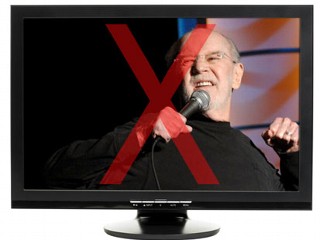You won't hear the seven dirty words come out of George Carlin's mouth again, and it's doubtful you'll ever hear them all on broadcast television, either.
Carlin, who died Sunday at age 71, cemented his reputation as one of comedy's most crass with his expletive-laced 1972 monologue, "Seven Words You Can Never Say on Television" (or re-print here). Not only did Carlin's cavalier ode to curses shock and offend his critics, it also led to a landmark Supreme Court ruling about what could and could not be said on broadcast TV and radio.
Despite that 1978 ruling, the Federal Communications Commission doesn't have a list of words it considers profane. In its consumer fact sheet, the FCC defines profanity as "including language so grossly offensive to members of the public who actually hear it as to amount to a nuisance."
So, with no black and white rules, it's up to the networks to decide what words are appropriate for air. While conventions have changed since the 70s, -- s*** is fine on basic cable past 10 p.m., and anything goes on premium channels -- for the most part, any slur more vivid than "ass" or "b****" (neither of which Carlin included among his set of seven) is verboten on broadcast TV.
Joan Rivers thinks that's just dumb.
"It's so silly and so stupid," said the veteran comedian and fashion critic, who got kicked off British television last week for saying f*** and s*** on a show that she noted was named, of all things, "Loose Women." "I think this is such a rough, tough, fast world, and everyone in their house should make their own rules. But don't make me fit in with your lifestyle when I've never met you. You have a child up at 11p.m., and you're worried about what they'll hear on TV? Put your child to bed and then sit down and hear the word c***. [One of Carlin's 'Seven.']"
Paul Mooney, who wrote for Carlin's contemporary Richard Pryor, echoed Rivers' call to loosen standards, given an appropriate time (after 10 p.m.) and forum (comedic).
"You don't go to a topless club and say, 'Why doesn't she put a bra on?' We should be allowed to say what we want to say," Mooney said. "Too many people are trying to control us, period. That's the problem. This is insanity. It's double talk. And I don't want to hear any double talk, I want straight talk."
But it's unlikely the FCC will embrace comedians' call to let curses run rampant across the air. More than three decades after Carlin first uttered his monologue, television and culture critics still consider his words too shocking for mainstream TV, especially in an atmosphere made even more sensitive by Don Imus and Michael Richards' 2007 racially-charged rants.
"The short answer is we're a long way away before Carlin's routine can be on broadcast TV," said David Bianculli, who critiques TV for NPR's "Fresh Air" and tvworthwatching.com. "Cable's loosening up more and more, but broadcast seems to be tightening. There are examples of things that were OK in the 70s that aren't allowed now, like slurs in 'All in the Family' that just wouldn't get by today.
"You may just have to wait for a generational power shift at the networks," he continued. "Certainly, in the 50s, you couldn't even use the word 'pregnant' on 'I Love Lucy.' We've grown up a lot from there, but it's because a generation grew up."
The FCC has loosened up in recent years, suggesting that generational shift could be on the horizon. In 2003, U2's Bono gushed, "this is really, really f****** brilliant" while accepting a Golden Globe, which sent 234 complaints -- against TV stations that carried the awards show -- flooding into the FCC. But the FCC didn't levy sanctions. Instead, it decided the f-word is permissible on broadcast TV as long as it does "not describe sexual or excretory activities or functions."
That doesn't mean the f-word will become as ubiquitous as "b****" or "ass" on broadcast anytime soon. Certainly, there are more than 234 Americans ready to fight if the FCC embraces f*** in all its scatalogical, sexual glory. Kristen Fyfe is one of them.
"We are a less civil society now than we were 30 years ago, and a lot of that comes through language and how we speak to each other," said Fyfe, a senior writer for the Culture and Media Institute, which, on its Web site, says it aims to "preserve and help restore America's culture, character, traditional values, and morals against the assault of the liberal media elite."
"We may be in a place where culturally, people don't cover their ears when they hear [f***], but as a parent of two kids, I feel like I need to watch broadcast TV with a remote in my hand to keep some sort of boundaries in my home," Fyfe continued. "Maybe people wouldn't be shocked by the 'Seven Dirty Words' today, but I think they'd still find it tasteless."
So, for the foreseeable future, you'll have to tune to premium cable (HBO, Showtime) or select basic cable programs ("Secret Stash," a block of language-unedited hilarity that Comedy Central airs every Saturday and Sunday at 1 a.m.) to get a fix of filth. And for those who really want to be shocked, Rivers has a suggestion:
"Come and see me at the Cutting Room," she said, referring to her upcoming, raunch-filled show at the NYC nightclub. "There's still shock, believe there's plenty. I'm still shocking them."




No comments:
Post a Comment